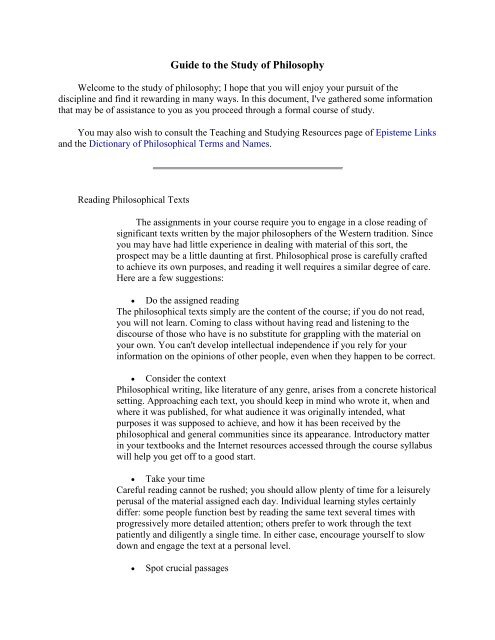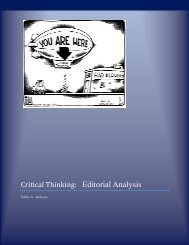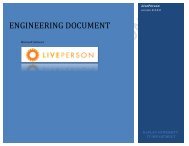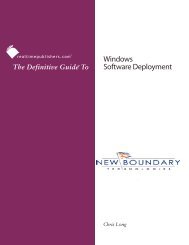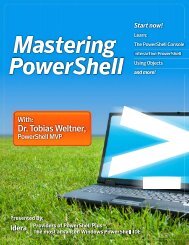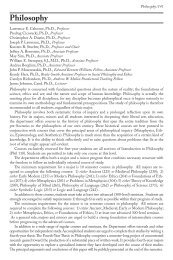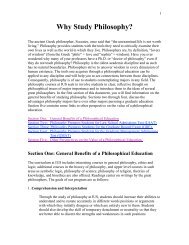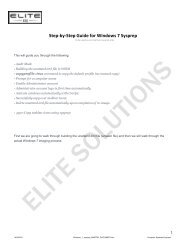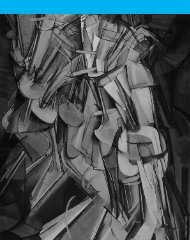Guide to the Study of Philosophy - Eddie Jackson
Guide to the Study of Philosophy - Eddie Jackson
Guide to the Study of Philosophy - Eddie Jackson
Create successful ePaper yourself
Turn your PDF publications into a flip-book with our unique Google optimized e-Paper software.
<strong>Guide</strong> <strong>to</strong> <strong>the</strong> <strong>Study</strong> <strong>of</strong> <strong>Philosophy</strong><br />
Welcome <strong>to</strong> <strong>the</strong> study <strong>of</strong> philosophy; I hope that you will enjoy your pursuit <strong>of</strong> <strong>the</strong><br />
discipline and find it rewarding in many ways. In this document, I've ga<strong>the</strong>red some information<br />
that may be <strong>of</strong> assistance <strong>to</strong> you as you proceed through a formal course <strong>of</strong> study.<br />
You may also wish <strong>to</strong> consult <strong>the</strong> Teaching and <strong>Study</strong>ing Resources page <strong>of</strong> Episteme Links<br />
and <strong>the</strong> Dictionary <strong>of</strong> Philosophical Terms and Names.<br />
Reading Philosophical Texts<br />
The assignments in your course require you <strong>to</strong> engage in a close reading <strong>of</strong><br />
significant texts written by <strong>the</strong> major philosophers <strong>of</strong> <strong>the</strong> Western tradition. Since<br />
you may have had little experience in dealing with material <strong>of</strong> this sort, <strong>the</strong><br />
prospect may be a little daunting at first. Philosophical prose is carefully crafted<br />
<strong>to</strong> achieve its own purposes, and reading it well requires a similar degree <strong>of</strong> care.<br />
Here are a few suggestions:<br />
• Do <strong>the</strong> assigned reading<br />
The philosophical texts simply are <strong>the</strong> content <strong>of</strong> <strong>the</strong> course; if you do not read,<br />
you will not learn. Coming <strong>to</strong> class without having read and listening <strong>to</strong> <strong>the</strong><br />
discourse <strong>of</strong> those who have is no substitute for grappling with <strong>the</strong> material on<br />
your own. You can't develop intellectual independence if you rely for your<br />
information on <strong>the</strong> opinions <strong>of</strong> o<strong>the</strong>r people, even when <strong>the</strong>y happen <strong>to</strong> be correct.<br />
• Consider <strong>the</strong> context<br />
Philosophical writing, like literature <strong>of</strong> any genre, arises from a concrete his<strong>to</strong>rical<br />
setting. Approaching each text, you should keep in mind who wrote it, when and<br />
where it was published, for what audience it was originally intended, what<br />
purposes it was supposed <strong>to</strong> achieve, and how it has been received by <strong>the</strong><br />
philosophical and general communities since its appearance. Introduc<strong>to</strong>ry matter<br />
in your textbooks and <strong>the</strong> Internet resources accessed through <strong>the</strong> course syllabus<br />
will help you get <strong>of</strong>f <strong>to</strong> a good start.<br />
• Take your time<br />
Careful reading cannot be rushed; you should allow plenty <strong>of</strong> time for a leisurely<br />
perusal <strong>of</strong> <strong>the</strong> material assigned each day. Individual learning styles certainly<br />
differ: some people function best by reading <strong>the</strong> same text several times with<br />
progressively more detailed attention; o<strong>the</strong>rs prefer <strong>to</strong> work through <strong>the</strong> text<br />
patiently and diligently a single time. In ei<strong>the</strong>r case, encourage yourself <strong>to</strong> slow<br />
down and engage <strong>the</strong> text at a personal level.<br />
• Spot crucial passages
Although philosophers do not deliberately spin out pointlessly excessive verbiage<br />
(no, really!), most philosophical texts vary in density from page <strong>to</strong> page. It isn't<br />
always obvious what matters most; philosophers sometimes glide superficially<br />
over <strong>the</strong> very points on which <strong>the</strong>ir entire argument depends. But with <strong>the</strong> practice<br />
you'll be getting week by week, you'll soon be able <strong>to</strong> highlight <strong>the</strong> most<br />
important portions <strong>of</strong> each assignment.<br />
• Identify central <strong>the</strong>ses<br />
Each philosophical text is intended <strong>to</strong> convince us <strong>of</strong> <strong>the</strong> truth <strong>of</strong> particular<br />
propositions. Although <strong>the</strong>se central <strong>the</strong>ses are sometimes stated clearly and<br />
explicitly, authors <strong>of</strong>ten choose <strong>to</strong> present <strong>the</strong>m more subtly in <strong>the</strong> context <strong>of</strong> <strong>the</strong><br />
line <strong>of</strong> reasoning which <strong>the</strong>y are established. Remember that <strong>the</strong> <strong>the</strong>sis may be<br />
ei<strong>the</strong>r positive or negative, ei<strong>the</strong>r <strong>the</strong> acceptance or <strong>the</strong> rejection <strong>of</strong> a<br />
philosophical position. At <strong>the</strong> most general level, you may find it helpful <strong>to</strong><br />
survey <strong>the</strong> exam study questions in your course study aids file as you read each<br />
assigned text.<br />
• Locate supportive arguments<br />
Philosophers do not merely state opinions but also undertake <strong>to</strong> establish <strong>the</strong>ir<br />
truth. The methods employed <strong>to</strong> support philosophical <strong>the</strong>ses can differ widely,<br />
but most <strong>of</strong> <strong>the</strong>m will be expressed one <strong>of</strong> <strong>the</strong> forms <strong>of</strong> logical argumentation.<br />
That is, <strong>the</strong> philosopher will (explicitly or implicitly) <strong>of</strong>fer premises that are<br />
clearly true and <strong>the</strong>n claim that a sound inference from <strong>the</strong>se premises leads<br />
inexorably <strong>to</strong> <strong>the</strong> desired conclusion. Although a disciplined study <strong>of</strong> <strong>the</strong> forms <strong>of</strong><br />
logical reasoning is helpful, you'll probably learn <strong>to</strong> recognize <strong>the</strong> most common<br />
patterns from early examples in your reading.<br />
• Assess <strong>the</strong> arguments<br />
Arguments are not all <strong>of</strong> equal cogency; we are obliged <strong>to</strong> accept <strong>the</strong> conclusion<br />
only if it is supported by correct inference from true premises. Thus, <strong>the</strong>re are two<br />
different ways in which <strong>to</strong> question <strong>the</strong> legitimacy <strong>of</strong> a particular argument:<br />
o<br />
o<br />
Ask whe<strong>the</strong>r <strong>the</strong> premises are true. (Remember that one or more <strong>of</strong> <strong>the</strong><br />
premises <strong>of</strong> <strong>the</strong> argument may be unstated assumptions.)<br />
Ask whe<strong>the</strong>r <strong>the</strong> inference from premises <strong>to</strong> conclusion is sound. (Here it<br />
will be helpful <strong>to</strong> think <strong>of</strong> applying <strong>the</strong> same pattern <strong>of</strong> reasoning <strong>to</strong> a<br />
more familiar case.)<br />
If all else fails, you may question <strong>the</strong> truth <strong>of</strong> <strong>the</strong> conclusion directly by proposing<br />
a counter-example which seems obviously <strong>to</strong> contradict it.<br />
• Look for connections<br />
Since <strong>the</strong>se texts occur within a tradition, <strong>the</strong>y are <strong>of</strong>ten directly related <strong>to</strong> each<br />
o<strong>the</strong>r. Within your reading <strong>of</strong> a particular philosopher, notice <strong>the</strong> way in which<br />
material in one portion <strong>of</strong> <strong>the</strong> text links up with material from ano<strong>the</strong>r. As <strong>the</strong><br />
semester proceeds, consider <strong>the</strong> ways in which each philosopher incorporates,
appropriates, rejects, or responds <strong>to</strong> <strong>the</strong> work <strong>of</strong> those who have gone before.<br />
Finally, make every possible effort <strong>to</strong> relate this philosophical text <strong>to</strong> what you<br />
already know from courses in o<strong>the</strong>r disciplines and from your own life<br />
experiences.<br />
Above all else, don't worry! You'll spend most <strong>of</strong> your class time going over<br />
<strong>the</strong> assigned readings, <strong>of</strong>ten in great detail. You'll have plenty <strong>of</strong> opportunities <strong>to</strong><br />
learn what o<strong>the</strong>r readers have found, <strong>to</strong> ask questions for clarification <strong>of</strong> puzzling<br />
passages, and <strong>to</strong> share your own insights with o<strong>the</strong>rs. As <strong>the</strong> semester proceeds,<br />
you will grow ever more confident in your own capacity <strong>to</strong> interpret philosophical<br />
texts.<br />
Using Electronic Texts<br />
The philosophers' pages here will provide you with convenient access <strong>to</strong><br />
electronic versions <strong>of</strong> most <strong>of</strong> <strong>the</strong> texts you'll be reading and <strong>to</strong> o<strong>the</strong>r texts by <strong>the</strong><br />
same or related authors. Please learn <strong>to</strong> make use <strong>of</strong> <strong>the</strong>se materials regularly. I<br />
think you'll find that e-texts <strong>of</strong>fer a number <strong>of</strong> advantages for research in<br />
philosophy:<br />
• With a little practice, you'll find <strong>the</strong> virtual library easy <strong>to</strong> get around in.<br />
Well-designed hypertext files are particularly useful, but even straight text<br />
files are <strong>of</strong>ten easier <strong>to</strong> manipulate than physical books.<br />
• It is much more convenient <strong>to</strong> compare related texts in electronic than in<br />
print form. (The trilingual version <strong>of</strong> Descartes's Meditations is an<br />
excellent example.<br />
• Using <strong>the</strong> utilities provided with your browser or word-processing<br />
s<strong>of</strong>tware makes it easy <strong>to</strong> search <strong>the</strong> text for key words or phrases and <strong>to</strong><br />
excerpt crucial passages for fur<strong>the</strong>r study.<br />
Exciting prospects! As David Hume wrote in a different context, "When we<br />
run over libraries, persuaded <strong>of</strong> <strong>the</strong>se principles, what havoc must we make?"<br />
Before committing any <strong>of</strong> our old print volumes <strong>to</strong> <strong>the</strong> flames, however, we might<br />
consider a few words <strong>of</strong> caution:<br />
• Not every significant text is available in electronic form. Although many<br />
worthwhile projects are busy expanding <strong>the</strong> number <strong>of</strong> texts on-line, <strong>the</strong><br />
process <strong>of</strong> conversion from print media <strong>to</strong> reliable e-text is timeconsuming<br />
and labor-intensive. It will be a long time before Internet<br />
resources can begin <strong>to</strong> rival <strong>the</strong> holdings <strong>of</strong> even a small research library.
• Because <strong>of</strong> copyright restrictions, <strong>the</strong> electronic texts available on <strong>the</strong><br />
Internet rarely include <strong>the</strong> best critical editions or <strong>the</strong> most recent<br />
translations <strong>of</strong> <strong>the</strong> work <strong>of</strong> major philosophers. (For those we must still<br />
rely on more costly print or CD-ROM media.) When using e-texts in <strong>the</strong><br />
preparation <strong>of</strong> a written assignment, you'll want <strong>to</strong> refer <strong>to</strong> <strong>the</strong> more<br />
definitive print versions before quoting directly.<br />
• Not all <strong>of</strong> <strong>the</strong> readily available e-texts are <strong>of</strong> <strong>the</strong> highest quality; scanning<br />
errors are common, and pro<strong>of</strong>-reading is sometimes spotty. Although I've<br />
tried <strong>to</strong> identify reliable versions, I've certainly not checked every word<br />
myself. Again, be sure <strong>to</strong> double-check against a more standard print<br />
version <strong>of</strong> <strong>the</strong> text.<br />
• Finally, in my own experience, at least, for <strong>the</strong> kind <strong>of</strong> leisurely,<br />
ruminative reading that most philosophical texts require, a physical<br />
volume—<strong>the</strong> kind <strong>of</strong> thing you can spread out on your lap or mark up with<br />
a pencil or even heave across <strong>the</strong> room—is still hard <strong>to</strong> beat.<br />
Philosophical Dialogue<br />
Verbal discussion <strong>of</strong> serious <strong>to</strong>pics is in no way tangential <strong>to</strong> <strong>the</strong> practice <strong>of</strong><br />
philosophy. From Socratic ga<strong>the</strong>rings <strong>to</strong> <strong>the</strong> philosophical conventions <strong>of</strong> <strong>to</strong>day,<br />
thinking things through out loud—and in <strong>the</strong> presence <strong>of</strong> o<strong>the</strong>rs—has always been<br />
<strong>of</strong> <strong>the</strong> essence <strong>of</strong> <strong>the</strong> philosophical method. (Most philosophical texts embody this<br />
give-and-take, ei<strong>the</strong>r in explicit use <strong>of</strong> dialogue form or by a more subtle<br />
alteration <strong>of</strong> proposal, objection, and reply in exposi<strong>to</strong>ry prose.) Your<br />
philosophical education demands that you enter in<strong>to</strong> <strong>the</strong> great conversation <strong>of</strong><br />
Western thought. A few suggestions may help:<br />
• Be prepared<br />
Productive dialogue presupposes informed participants. This means that during<br />
every class session, each <strong>of</strong> us will have read <strong>the</strong> material assigned for <strong>the</strong> day, we<br />
will pay careful attention <strong>to</strong> what o<strong>the</strong>rs have already said, and we will think<br />
carefully before speaking. Of course, each <strong>of</strong> us will <strong>of</strong>ten be mistaken, but none<br />
<strong>of</strong> us should ever speak randomly.<br />
• Respect o<strong>the</strong>rs<br />
Joint participants in dialogue show a deep, personal respect for each o<strong>the</strong>r. We<br />
owe it <strong>to</strong> each o<strong>the</strong>r <strong>to</strong> listen well and <strong>to</strong> give each o<strong>the</strong>r <strong>the</strong> benefit <strong>of</strong> doubt in<br />
interpreting charitably what has been said, trying always <strong>to</strong> see <strong>the</strong> worthwhile<br />
point. Although we will rarely find ourselves in <strong>to</strong>tal agreement on <strong>the</strong> issues at<br />
stake, we will never attack or make fun <strong>of</strong> each o<strong>the</strong>r personally.
• Expect conflict<br />
Disagreement with an expressed opinion and criticism <strong>of</strong> its putative support is<br />
not disrespectful; it is an acknowledgment that we are taking <strong>the</strong> matter seriously.<br />
The more significant <strong>the</strong> issue under discussion, <strong>the</strong> more likely our exchanges<br />
will become passionate, even heated. But we must always deal with each o<strong>the</strong>r<br />
fairly, helping each o<strong>the</strong>r <strong>to</strong> see <strong>the</strong> light.<br />
• Quality counts more than quantity<br />
No discussion will be perfectly balanced among its participants, and each <strong>of</strong> us<br />
will have days on which we are quieter or more vocal. But no one should<br />
dominate <strong>the</strong> conversation, nor should anyone be utterly silent. If you find<br />
yourself speaking <strong>to</strong>o much, try <strong>to</strong> listen more; if you find yourself saying <strong>to</strong>o<br />
little, look for opportunities <strong>to</strong> contribute. But always remember that it is what<br />
you say, not <strong>the</strong> fact <strong>of</strong> your speaking, that matters.<br />
• Ask questions<br />
Not every contribution <strong>to</strong> <strong>the</strong> dialogue needs <strong>to</strong> be <strong>the</strong> proposal or defense <strong>of</strong> a<br />
<strong>the</strong>sis. It is always proper <strong>to</strong> ask for a clarification <strong>of</strong> <strong>the</strong> meaning <strong>of</strong> something<br />
that has already been said or for <strong>the</strong> justification <strong>of</strong> a claim that has already been<br />
made. (Those who are naturally quiet may find that a well-timed question is <strong>the</strong><br />
most comfortable way <strong>to</strong> participate in <strong>the</strong> dialogue.)<br />
Above all, remember that philosophical discussion is a cooperative activity,<br />
aiming at a mutual achievement <strong>of</strong> truth (or, at least, convergence on a shared<br />
opinion). It is not a competition in which "points" are <strong>to</strong> be scored against an<br />
opponent. We are working <strong>to</strong>ge<strong>the</strong>r, and each can learn from all.<br />
The Electronic Forum<br />
Conducting an on-line discussion during <strong>the</strong> semester enables us <strong>to</strong> expand<br />
our study <strong>of</strong> philosophy beyond <strong>the</strong> spatial and temporal boundaries <strong>of</strong> traditional<br />
class meetings. If you've not participated in this way extensively before, it may<br />
take a little energy <strong>to</strong> get started, but you'll soon find this medium a comfortable<br />
one for communicating with <strong>the</strong> entire group. Early in <strong>the</strong> session, we'll get <strong>to</strong><br />
know each o<strong>the</strong>r and learn <strong>to</strong> manage our networking <strong>to</strong>ols effectiely.<br />
Here are a few general ground rules for getting started on <strong>the</strong> electronic<br />
forum:<br />
• Check <strong>the</strong> discussion space frequently<br />
Every member <strong>of</strong> <strong>the</strong> class will be contributing multiple messages each week—<br />
perhaps one or two substantive efforts and several short comments. This means<br />
that your list <strong>of</strong> messages will pile up pretty quickly. You'll want <strong>to</strong> read it daily,
or at least several times a week, so that you have a chance <strong>to</strong> chime in on a subject<br />
before we move on <strong>to</strong> something else.<br />
• Avoid lengthy quotes<br />
When responding <strong>to</strong> someone else's comments, don't quote <strong>the</strong> whole message—<br />
we've all seen it already. Just mention <strong>the</strong> person's name, <strong>the</strong> date <strong>of</strong> <strong>the</strong> message,<br />
and quote <strong>the</strong> few crucial lines that provide a context for what you want <strong>to</strong> say.<br />
(Some identification is a good idea, since we'll all be "speaking" at once.)<br />
• Never be deliberately <strong>of</strong>fensive<br />
Lacking <strong>the</strong> visual cues present in face-<strong>to</strong>-face communication, typed electronic<br />
messages can easily seem more harsh than <strong>the</strong>y were intended <strong>to</strong> be. Even in <strong>the</strong><br />
passion <strong>of</strong> a vigorous philosophical exchange, let's try <strong>to</strong> be considerate <strong>of</strong> each<br />
o<strong>the</strong>r on both sides—in writing and in reading—by assuming <strong>the</strong> best. No<br />
"flaming," please.<br />
Remember that this substitute for <strong>the</strong> more traditional methods <strong>of</strong> discussion<br />
is still unfamiliar for some <strong>of</strong> us. That's no reason <strong>to</strong> be timid: let's plunge in, try<br />
everything we can think <strong>of</strong>, learn from our mistakes and from our successes, and<br />
enjoy <strong>the</strong> adventure.<br />
Writing <strong>Philosophy</strong><br />
Write <strong>to</strong> learn. Expressing your thoughts is an excellent way <strong>of</strong> discovering<br />
what <strong>the</strong>y really are. Even when you're <strong>the</strong> only one who ever sees <strong>the</strong> results <strong>of</strong><br />
your explorations, trying <strong>to</strong> put <strong>the</strong>m down in written form <strong>of</strong>ten helps, and when<br />
you wish <strong>to</strong> communicate <strong>to</strong> o<strong>the</strong>rs, <strong>the</strong> ability <strong>to</strong> write clear, meaningful prose is<br />
vital. Here are some suggestions for proceeding:<br />
• Understand <strong>the</strong> assignment<br />
Whe<strong>the</strong>r you're completing a specific assignment or developing your own project,<br />
it is important <strong>to</strong> have <strong>the</strong> aims firmly in mind. Focus on a single question you<br />
wish <strong>to</strong> address, be clear about your own answer <strong>to</strong> it, and explicitly state a <strong>the</strong>sis<br />
that answers <strong>the</strong> question. You will <strong>of</strong>ten want <strong>to</strong> divide <strong>the</strong> central issue in<strong>to</strong><br />
several smaller questions, each with its own answer, and this will naturally lead <strong>to</strong><br />
a coherent structure for <strong>the</strong> entire essay.<br />
• Interpret fairly<br />
Most <strong>of</strong> your writing projects will begin with a careful effort <strong>to</strong> interpret a<br />
philosophical text, and this step should never be taken lightly. Your first<br />
responsibility is <strong>to</strong> develop an accurate reading <strong>of</strong> <strong>the</strong> original text; <strong>the</strong>n your<br />
criticism can begin. Focus primarily on <strong>the</strong> adequacy <strong>of</strong> <strong>the</strong> arguments which<br />
support <strong>the</strong> stated conclusions. If you disagree, you can look for <strong>the</strong> weaknesses
<strong>of</strong> that support; if you agree, you can defend it against possible attacks.<br />
• Support your <strong>the</strong>sis<br />
Don't just state your own position; make it <strong>the</strong> conclusion <strong>of</strong> a line <strong>of</strong> reasoning.<br />
Claim only what you can prove (or are, at least, prepared <strong>to</strong> defend), and support<br />
it with evidence and argument. <strong>Philosophy</strong> is not just a list <strong>of</strong> true opinions, but<br />
<strong>the</strong> reasoned effort <strong>to</strong> provide justification.<br />
• Consider alternatives<br />
Be sure <strong>to</strong> explore arguments on all sides <strong>of</strong> <strong>the</strong> issue you address. Of course you<br />
will want <strong>to</strong> emphasize <strong>the</strong> reasoning that supports your <strong>the</strong>sis, but it is also<br />
important <strong>to</strong> consider likely objections and <strong>to</strong> respond with counter-arguments. Be<br />
especially carefully in your use <strong>of</strong> examples: <strong>the</strong> best positive example can only<br />
clarify meaning and lend some evidentiary confirmation, but a single counterexample<br />
disproves a general claim completely.<br />
• Omit <strong>the</strong> unnecessary<br />
Include in your written work only what is germane <strong>to</strong> your <strong>to</strong>pic: after <strong>the</strong> first<br />
draft, mercilessly eliminate from your text anything that does not directly and<br />
uniquely support <strong>the</strong> <strong>the</strong>sis. Padding with irrelevant or redundant material is never<br />
worthwhile. Be particularly careful in your use <strong>of</strong> material prepared by o<strong>the</strong>rs: do<br />
not plagiarize, paraphrase without attribution, quote directly <strong>of</strong>ten or at length, or<br />
rely extensively on a single secondary source.<br />
• Write clearly<br />
It is your responsibility as writer <strong>to</strong> express yourself in a way that can be<br />
unders<strong>to</strong>od. Use specific, concrete language in active voice whenever you can.<br />
Define your terms explicitly and use <strong>the</strong>m consistently throughout your paper.<br />
Finally, you may find it helpful <strong>to</strong> keep an appropriate audience in mind as<br />
you write. Don't write just for <strong>the</strong> instruc<strong>to</strong>r and your classmates—that is, don't<br />
assume that your audience has pr<strong>of</strong>essional knowledge <strong>of</strong> <strong>the</strong> philosophical texts<br />
or <strong>to</strong>tal awareness <strong>of</strong> every conversation that has taken place, inside and outside<br />
<strong>the</strong> classroom. Unless o<strong>the</strong>rwise directed by <strong>the</strong> details <strong>of</strong> a particular assignment,<br />
think <strong>of</strong> yourself as presenting <strong>the</strong> material <strong>to</strong> a friend, your parents, or a class:<br />
intelligent, interested people who are well-informed generally but who lack your<br />
knowledge <strong>of</strong> <strong>the</strong> philosophical issues. Write <strong>to</strong> teach.
Paper Submission <strong>Guide</strong>lines<br />
All written assignments should be submitted in <strong>the</strong> designated form, and<br />
should include a clear indication <strong>of</strong> <strong>the</strong> course and assignment number. Be sure <strong>to</strong><br />
observe <strong>the</strong> designated due date; work that is turned in late will au<strong>to</strong>matically<br />
receive a significantly reduced grade.<br />
It is reasonable <strong>to</strong> expect any assignment prepared outside class <strong>to</strong> be written<br />
well, with careful attention <strong>to</strong> grammar, spelling, and usage. Philosophical writing<br />
should avoid <strong>of</strong>fensive sexual, racial, ethnic, religious, and material or physical<br />
bias.<br />
You may employ any one <strong>of</strong> <strong>the</strong> methods <strong>of</strong> attribution described in The<br />
Chicago Manual <strong>of</strong> Style, but must be consistent in both notes and bibliographies.<br />
Direct quotations from <strong>the</strong> philosophers should be taken from <strong>the</strong> standard edition<br />
<strong>of</strong> <strong>the</strong> works or <strong>the</strong> definitive English translation as listed in Richard T.<br />
DeGeorge, The Philosopher's <strong>Guide</strong> or from <strong>the</strong> texts you have been asked <strong>to</strong> read<br />
for this course.<br />
If you make significant use <strong>of</strong> an electronic source, remember that this<br />
deserves documentation, <strong>to</strong>o, including <strong>the</strong> author's name, titles for both <strong>the</strong> page<br />
and <strong>the</strong> site, a complete Uniform Resource Loca<strong>to</strong>r, and <strong>the</strong> date on which you<br />
viewed it on-line. Thus, for example, work on George Berkeley's philosophy<br />
might include references <strong>to</strong>:<br />
• George Berkeley, A Treatise concerning <strong>the</strong> Principles <strong>of</strong> Human<br />
Knowledge, Section 22. HTML edition by David R. Wilkins.<br />
Accessed 30<br />
September 1998.<br />
• "George Berkeley," The Internet Encyclopedia <strong>of</strong> <strong>Philosophy</strong>, ed. by<br />
James Fieser. <br />
Accessed 25 April 1999.<br />
• Garth Kemerling, "Berkeley's Immaterialism," <strong>Philosophy</strong> Pages.<br />
Accessed 14 Oc<strong>to</strong>ber<br />
2000.<br />
• Peter B. Lloyd, "Berkeley's Metaphysics," Berkeley Studies.<br />
Accessed 23<br />
June 1999.<br />
Although you're welcome <strong>to</strong> use such sources, it is not possible <strong>to</strong> write an<br />
adequate research paper using on-line materials alone. Print resources are far<br />
more extensive, detailed, and reliable.
In addition <strong>to</strong> <strong>the</strong>se formal criteria, please consult <strong>the</strong> general suggestions for<br />
Writing <strong>Philosophy</strong> above.<br />
Writing Essay Exams<br />
Since a significant portion <strong>of</strong> your grade for this course will depend upon<br />
assessment <strong>of</strong> your knowledge and skill as reflected in examinations, here are a<br />
few suggestions for dealing with essay exams:<br />
• Be prepared<br />
Rely heavily upon <strong>the</strong> study questions distributed at <strong>the</strong> outset <strong>of</strong> <strong>the</strong> course: look<br />
over <strong>the</strong>m at <strong>the</strong> beginning <strong>of</strong> each unit; use <strong>the</strong>m <strong>to</strong> guide your reading <strong>of</strong> <strong>the</strong><br />
texts and our discussion in class; and review <strong>the</strong>m before <strong>the</strong> exam. If you have<br />
considered <strong>the</strong>se issues fully, nothing on <strong>the</strong> exam itself can surprise you. Arrive<br />
promptly for <strong>the</strong> exam, and try <strong>to</strong> be well-rested, and relaxed.<br />
• Understand <strong>the</strong> question<br />
Before beginning <strong>to</strong> write, read each question carefully and completely; it will ask<br />
that you address a specific issue in a particular way. Pay close attention <strong>to</strong> words<br />
(such as "Describe...," "Explain...," "Compare and contrast...," "Assess...," and<br />
"Evaluate...") that suggest <strong>the</strong> appropriate mode <strong>of</strong> response. If you are uncertain<br />
what a question means, ask me for a clarification. Take a moment <strong>to</strong> organize<br />
your thoughts on <strong>the</strong> subject, and dive in.<br />
• Stick <strong>to</strong> <strong>the</strong> point<br />
Make sure that your essay is directly relevant <strong>to</strong> <strong>the</strong> question asked. Although you<br />
will know a great deal more about <strong>the</strong> philosopher or <strong>to</strong>pic at issue than your<br />
answer requires, it will be read only for information and/or argumentation that<br />
responds <strong>to</strong> <strong>the</strong> specific question. If you believe that additional material is<br />
required, indicate clearly and explicitly how it connects with <strong>the</strong> matter at hand.<br />
• Use your time wisely<br />
Although essay exams in philosophy are not meant <strong>to</strong> be intensely time-pressured,<br />
<strong>the</strong>y must be completed within certain limits. You may be asked <strong>to</strong> write four or<br />
five short essays during an exam, allowing fifteen or twenty minutes for each.<br />
Don't get so absorbed in one question that you spend much more than its share <strong>of</strong><br />
<strong>the</strong> available time; if you have more <strong>to</strong> say, jot down a note or two, move on <strong>to</strong><br />
ano<strong>the</strong>r question, and return <strong>to</strong> complete your answer if time allows.<br />
• Make every word count<br />
Although it is always helpful <strong>to</strong> write clearly—that is, in complete, grammatically<br />
correct sentences—<strong>the</strong>re is no need <strong>to</strong> craft beautiful prose. Avoid lengthy
prefa<strong>to</strong>ry, transitional, and summary verbiage. Get <strong>the</strong> essentials down on paper,<br />
and trust <strong>the</strong> instruc<strong>to</strong>r <strong>to</strong> evaluate your essay by its quality, not its quantity.<br />
For fur<strong>the</strong>r guidance, please consult <strong>the</strong> general suggestions for Writing<br />
<strong>Philosophy</strong> above.


